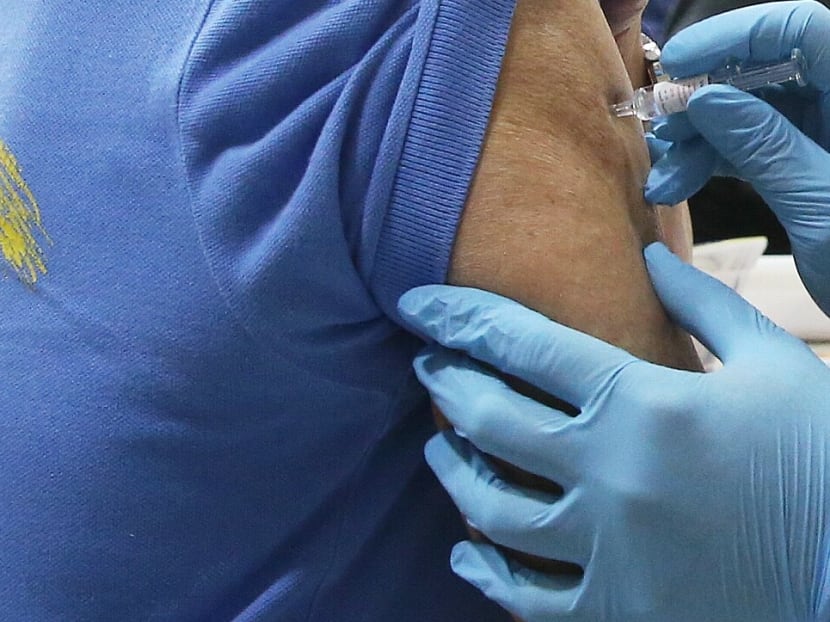TTSH expands scheme for seniors to get flu vaccines without booking or prescription in bid to drive take-up
SINGAPORE — Eligible seniors seeing doctors at specialist outpatient clinics in Tan Tock Seng Hospital (TTSH) may receive their influenza and pneumococcal vaccine shots during their appointments as the hospital looks to drive up the uptake of these vaccines.

A senior receiving a flu vaccine in 2019.
- Tan Tock Seng Hospital is making it easier for seniors to get their flu vaccine shots
- Patients going for medical appointments can stay at the clinics where they are and receive the jabs
- They do not need to make a booking or get doctors to prescribe it in the nurses-led initiative
- The move, piloted in seven specialist outpatient clinics, will be progressively expanded to 32 other clinics in 2023
- With travel resuming and Covid-19 curbs scaling back, certain seniors with medical conditions are at higher risk of severe influenza infection, which may lead to death
SINGAPORE — Eligible seniors seeing doctors at specialist outpatient clinics in Tan Tock Seng Hospital (TTSH) may receive their influenza and pneumococcal vaccine shots during their appointments as the hospital looks to drive up the uptake of these vaccines.
Simply put, these patients can get their jabs without having to make a vaccination appointment. They can stay where they are at the clinic they are visiting and they do not need their doctor to prescribe it.
This initiative, which is run independently by trained nurses and piloted in October 2020 at seven specialist outpatient clinics, will be progressively expanded to 32 other clinics within the hospital from next year.
WHY IS TTSH DOING THIS?
A study by the National Centre for Infectious Diseases (NCID) published last month found that older adults with metabolic comorbidities, who are at high risk of severe influenza infection, retained good immune response to the influenza vaccine.
People who have metabolic comorbidities have one or more conditions that are associated with obesity such as diabetes, hypertension and hypercholesterolemia (a lipid disorder where bad cholesterol in the body is too high).
The immune response in these older adults, namely those aged 65 and above, was also not inferior to their counterparts without metabolic comorbidities.
Dr Sapna Sadarangani, the study’s primary investigator and a consultant at NCID, said that this finding was contrary to the hypothesis that older adults may not respond as well as younger ones to vaccines given how immune systems decline as people age.
The study, done between June and December 2017, sought to examine the vaccine immune response of seniors living in the community, where influenza typically circulates year-round. Their antibody response to the vaccine was measured one month after vaccination.
Researchers focused on older adults with metabolic comorbidities given the rising prevalence of diabetes and obesity here. The median age of the study’s participants was 71, and 89 per cent of them had at least one chronic illness.
HOW WILL PATIENTS BE SELECTED?
- An algorithm that runs patients’ data will actively identify eligible patients based on their medical records and vaccination history, among others
- Trained nurses for this nurse-led initiative will offer the vaccines to the identified patients and provide counselling on possible allergies, side effects and cost of the vaccines
- TTSH’s nurse clinician Ye Xiuhua said that nurses will approach patients at opportune times such as when they are waiting for blood test results, to “value add” to their clinic visits
- After administering the vaccine, the nurses will provide post-vaccine education
- This is different from the practice now where the doctor must prescribe the jab before nurses can administer them
- Besides the flu vaccine, the pneumococcal vaccine helps to prevent pneumococcal disease caused by a bacteria, which could infect the lungs (causing pneumonia), ear (otitis media), brain (meningitis), blood (bacteremia) and other serious infections
WHY DOES IT MATTER?
Dr Sadarangi said that an increase in influenza transmission this year and in the following years is anticipated as travel resumes and Covid-19 curbs are lifted.
This means that seniors with metabolic comorbidities are at higher risk of severe influenza infection, which could result in admissions into intensive care units and even death.
Notably, the study by NCID found that participants who engaged in physical activities after getting their flu jab have a higher level of antibodies, compared to those with rare activity. This was specifically for the influenza strain A/H3N2, which is the most common circulating strain.
“Even participants who took up light physical activity, they benefited from a higher response compared to those with rare activity,” Dr Sadarangi added.
Associate Professor Angela Chow, head and senior consultant of the department of preventive and population medicine at TTSH, said that with flu transmission on the rise, it is important to increase vaccine uptake among vulnerable seniors.
The National Population Health Survey 2020 showed that the overall flu vaccination coverage among Singapore residents aged 18 to 74 years was 17 per cent in 2020 — similar to 17.4 per cent in 2019. This was higher than 13.1 per cent in 2017.
The proportion of adults aged 65 to 74 years who reported ever having received pneumococcal vaccine increased from 11.9 per cent in 2017 to 14.4 per cent in 2020.
Assoc Prof Chow said that encouragingly, the hospital has administered more than 4,000 influenza vaccines and more than 1,000 pneumococcal vaccines to seniors through the initiative in the first 18 months.
CORRECTION: A previous version of this article named the study’s principal investigator as Dr Sapna Sandarangani and cited a survey called the National Health Population Survey. These are incorrect. It should be Dr Sapna Sadarangani and the National Population Health Survey instead. It also stated that the programme will be progressively expanded to other clinics in 2023. This is incorrect. The programme will be expanded from 2023. We are sorry for the errors.











